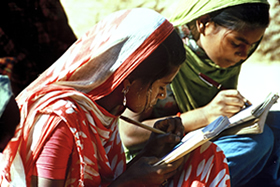Overview: Education, Training & Information
 |
| Two young mothers learning to write in a literacy class conducted by Literacy House at a village near Lucknow, in India. (Photo: UN) |
Rural women's access to education and training can have a major impact on their potential to access and benefit from income-generating opportunities and improve their overall well-being. A variety of approaches, including non-formal education, technical and vocational training, agricultural extension services, workplace training, training in new technologies and literacy and numeracy training are needed to address the various challenges rural women face. In addition, information and communication technologies (including mobile and electronic communication, etc.), supported by the right policies and institutional frameworks, can provide rural women with alternative avenues to access information related to their rights, services and resources, and social protection (e.g. identification card registration; laws on land, inheritance, and domestic/gender-based violence; and agriculture, market, health, nutrition information (among other).
Examples of Task Force member approaches to education, training and information include the ITC-ILO's Gender and Non Discrimination Programme, which partnered in a multi-stakeholder project on capacity building for the integration of women in sustainable development and economic policies. Elsewhere, FAO and IFAD also collaborate on an ongoing basis on communication for rural development, gender and land rights, producer organizations and cooperatives, awareness on socio-economic and gender issues, education and training for rural people, capacity building in socio-economic and gender analysis and institutional innovations. UNESCO's Global Partnership for Girls' and Women's Education supports efforts to improve girls' and women's access to secondary education as well as women's literacy, particularly for those who are excluded or marginalized from education in rural areas. UNDP pays special attention to the improvement of rural women's entrepreneurship skills through training in production and techniques, business management and functional literacy. UNIDO also works to improve the entrepreneurial/technical skills of rural and women entrepreneurs and to strengthen relevant support institutions and service providers to promote the development of entrepreneurship among rural women and communities in general. WFP supports training on nutrition, health, lifeskills, literacy and numeracy, and also facilitates sharing of knowledge of legal, political and social institutions for rural women. In partnership with the Barefoot College of India, UN Women supports hands on training of rural illiterate grandmothers in solar technology, so that they can become Barefoot Solar Engineers who will be equipped to solar electrify their villages. This provides them with an opportunity to access jobs in the green energy sector, and enhance poor rural household's living standard.